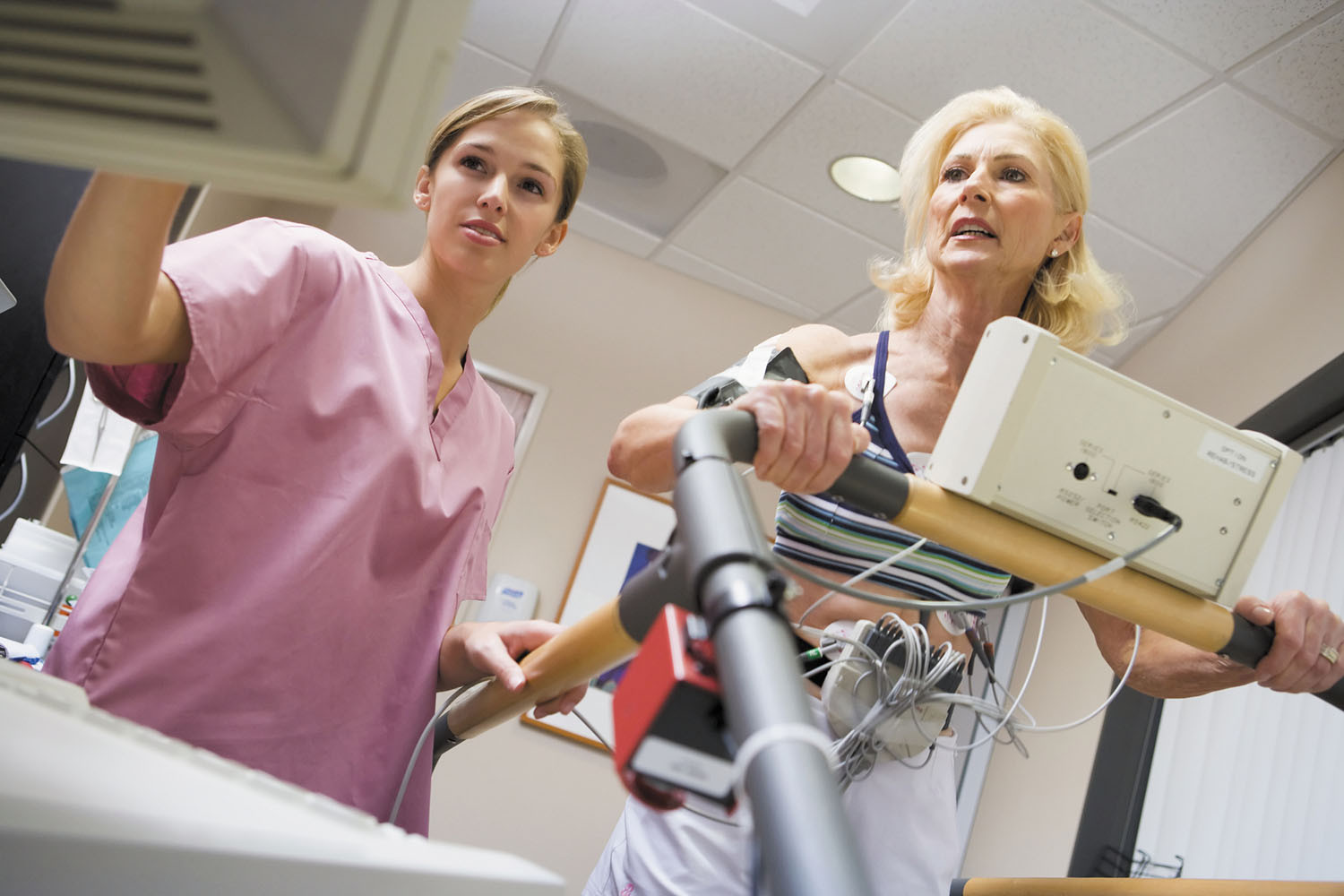What to expect during an exercise stress test
Although no longer routine, this test is still a common, safe way to assess people with heart disease symptoms.

Image: © monkeybusinessimages/Getty Images
That chest discomfort you felt during your evening walk disappeared once you got back home. But a week later, you're carrying a laundry basket upstairs and the pain returns, although only briefly. It's time to call your doctor to discuss these symptoms — and possibly undergo an evaluation for coronary disease.
One test you may need is an exercise stress test, also called a treadmill test. As recently as a decade or so ago, doctors ordered these tests as part of a routine check-up in middle-aged and older men, regardless of their symptoms. Today, they're done mainly in people with symptoms that suggest heart disease, says Dr. Hicham Skali, a cardiologist at Harvard-affiliated Brigham and Women's Hospital. "In general, that means stable angina, which refers to chest pain that occurs in predictable patterns during exercise or other exertion," he says. Angina occurs when the heart muscle isn't getting enough blood, which is more likely during physical activity.
The exercise stress test uses an electrocardiogram (ECG) to record the heart's electrical activity. Changes in the ECG reading can signify blood flow abnormalities caused by blockages in the heart's arteries or other problems in the heart. The test is also done before a person starts a cardiac rehabilitation program, and in some cases, before starting an exercise regimen (see "Do I need a stress test before starting a new workout program?").
Do I need a stress test before starting a new workout program?There's no one-size-fits-all answer to this question, says Harvard cardiologist Dr. Hicham Skali. It depends on your baseline risk for heart disease and what type of exercise you're planning to do. For example, say you're a man in your 60s who has diabetes and a family history of cardiovascular disease. If you decide to start taking daily walks with your dog, you probably don't need a stress test. "But if you've signed on for a 'couch-to-5K' program and haven't exercised in years, then it's advisable to get a test before you start training," says Dr. Skali. |
At the clinic
An exercise stress test is conducted by a clinician (usually an exercise physiologist) and supervised by a physician. First, the clinician will review your medical history and ask questions about your heart-related symptoms, such as when they occur and how quickly they resolve. You'll also be asked about any problems with your hips, knees, or ankles and if you ever use a cane or walker. Although most tests are done on a treadmill, people who have trouble walking can use an exercise bike. Those who can't use their legs can use an arm-powered exercise machine.
Next, you'll have a number of small adhesive pads stuck on your chest and abdomen. In men, this sometimes requires shaving some chest hair. Women can wear a bra; the chest pads are placed just above and below the breasts. Each pad is attached to a plastic-coated wire that feeds into the ECG system. A cuff on your arms periodically measures your blood pressure.
After a baseline recording taken at rest, you begin walking on a treadmill at a slow pace (under 2 mph). Every few minutes, the speed and steepness of the treadmill increase, making you work harder. The goal is to exercise until you're too tired or out of breath. But some people stop because of chest or leg pain. Sometimes the clinician stops the test because of worrisome changes on the ECG or in blood pressure.
You finish with a few minutes of slow walking to cool down, and then sit quietly for another 15 minutes or so. Your heart rate, ECG, and blood pressure are monitored the entire time, and the clinician keeps tabs on how you look and how you feel.
What the results mean
Your test results can be either normal (a serious heart artery blockage is unlikely), abnormal (a serious blockage is likely), or in some cases, equivocal (the results are unclear). Keep in mind that no test is 100% accurate. About 10% to 15% of people with normal results may actually have significant coronary artery disease. The opposite is also true: up to 15% of people with abnormal results don't have heart disease. Abnormal results usually warrant additional tests (in addition to habits such as eating a healthy diet and practicing stress management techniques). And if your results are normal, be sure to stick to those healthy habits as well to keep the odds in your favor.
Disclaimer:
As a service to our readers, Harvard Health Publishing provides access to our library of archived content. Please note the date of last review or update on all articles.
No content on this site, regardless of date, should ever be used as a substitute for direct medical advice from your doctor or other qualified clinician.















